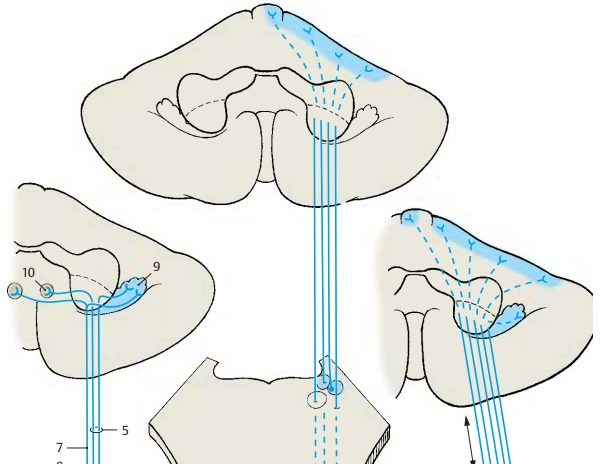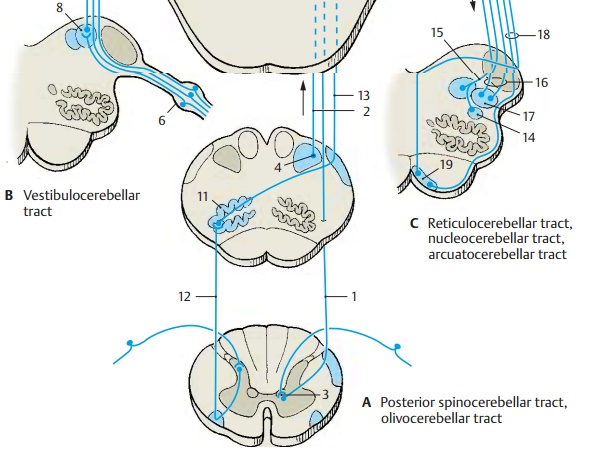Chapter: Human Nervous System and Sensory Organs : Cerebellum
Inferior Cerebellar Peduncle (Restiform Body)
Pathways
Inferior Cerebellar Peduncle (Restiform Body)
The inferior cerebellar peduncle contains
the following fiber systems:
Posterior spinocerebellar tract and cuneocerebellar tract
(A).The fibers of theposterior
spinocerebellar tract (Flechsig’stract) (A1) originate from cells of the poste-rior
thoracic nucleus (Clarke’s column)
(A3),in which the afferent fibers of
the proprio-ceptive sensibility terminate (tendon or-gans, muscle spindles, pp.
312, 314). The re-gion supplied by this tract is restricted to the lower
extremity and the lower trunk. The fibers of the posterior spinocerebellar
tract terminate as mossy fibers in the ver-mis and intermediate zone of the
anterior lobe and in the pyramid. The corresponding fibers for the upper
extremity and the upper part of the trunk collect in the lateralcuneate nucleus (Monakow’s
nucleus) (A4)and extend as cuneocerebellar tract (A2) to the same areas. The anterior
spinocerebellar tract reaches the cerebellum via the supe-rior cerebellar
peduncle (brachium con-junctivum).
Vestibulocerebellar tract (B).The
cerebel-lum receives primary and secondary vesti-bular fibers. The primary
fibers (B5) origi-nate from the vestibular ganglion (B6) (pre-dominantly from the
semicircular ducts) and run to the cerebellum without synaps-ing. The secondary
fibers (B7) synapse in the vestibular nuclei (B8). Nearly all fibers terminate in the nodulus, flocculus (B9), and fastigial nucleus (B10) but some termi-nate in the uvula.
The connection with the vestibular nuclei also contains cerebellofu-gal fibers
(cerebellovestibular tract), which
originate from the terminal areas just men-tioned and from the vermis of the
anterior lobe. Some of them synapse in the lateral vestibular nucleus and
extend in the vesti-bulospinal tract to the spinalcord.


Olivocerebellar tract (A).The
olive (A11),which may be regarded as
a cerebellar nu-cleus transposed ventrally, sends all its fibers to the
cerebellum. The olive and its accessory nuclei receive ascending fibers from
the spinal cord (spino-olivary tract)
(A12), fibers from the cerebral
cortex and from extrapyramidal nuclei (centraltegmental
tract, p. 144, A). The fibers syn-apse in specific segments of the olive to
form the olivocerebellar tract (A13), which crosses to the opposite
side and extends to the contralateral half of the cerebellum. The fibers of the
olivary complex terminate as climbing fibers in the cerebellar cortex: the
fibers of the accessory nuclei (termination zone of the spino-olivary tract)
run to the cortex of vermis and intermediate zone of the anterior lobe, while
the fibers of the main nucleus (termination zone of cortical fibers and
tegmental tract) run to the cere-bellar hemispheres.
Reticulocerebellar tract, nucleocerebellar tract, and
arcuatocerebellar tract (C).Thelateral reticular nucleus (C14)
receives ex-teroceptive sensory fibers which ascend to-gether with the
spinothalamic tracts. The postsynaptic fibers run as reticulocerebellartract (C15)
through the ipsilateral cerebellarpeduncle to the vermis and the hemisphere.
The nucleocerebellar tract (C16) transmits tactile impulses of the
facial area primarily from the trigeminal nuclei (C17) to the cere-bellum. The fibers of the arcuatocerebellartract (C18)
originate in the arcuate nucleus(C19)
and run to the floor of the fourth ven-tricle, where they form the medullary striae. They run crossed and
uncrossed and are thought to terminate in the flocculus.
The uncinate fasciculus of cerebellum, a
cere-bellospinal tract originating in the con-tralateral fastigial nucleus, has
not been un-equivocally demonstrated in the human brain.
Related Topics